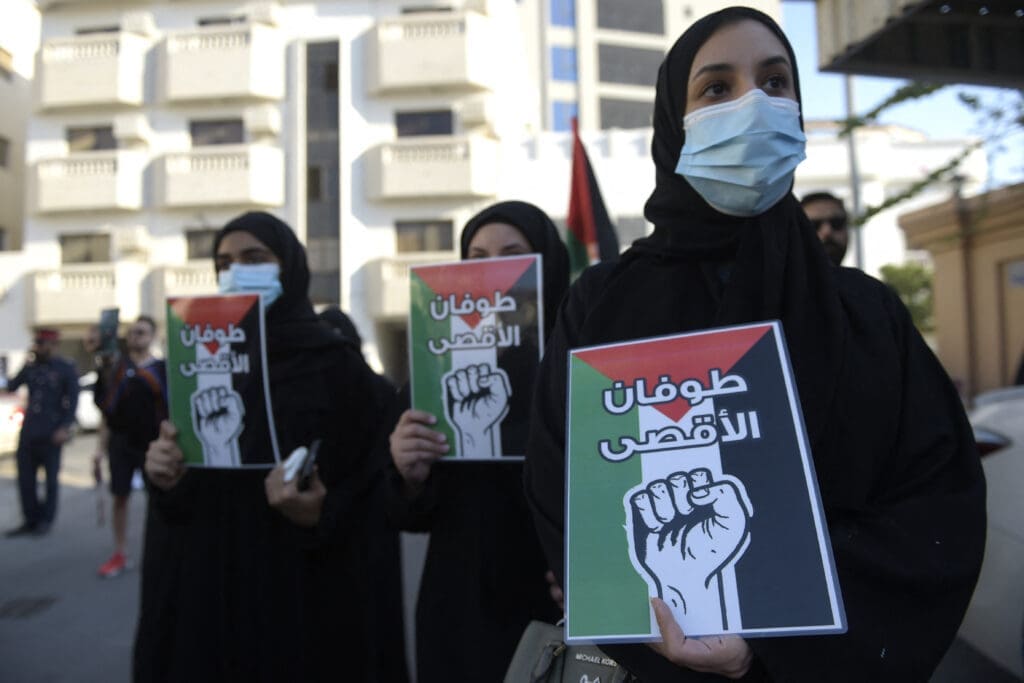Four years ago this month, Bahrain joined its ally the United Arab Emirates (UAE) in formalizing diplomatic relations with Israel. After signing the Abraham Accords at the White House on September 15, 2020, Bahrain and Israel opened embassies, signed numerous bilateral agreements, established business contacts and launched direct commercial travel.
Yet Bahrain, like other Arab signatories to the Abraham Accords, now faces a significant dilemma amid Israel’s ongoing war on Gaza and its expansion into other parts of the Middle East. Although Manama, which hosts the largest American naval base in the region, closely aligns with Washington on many issues and has interests in remaining in the Abraham Accords, Bahrain’s population is firmly pro-Palestinian, fueling a rift between the government and society that stands to widen as the Gaza war continues.
Sympathy for the Palestinians comes from many segments of Bahraini society. Bahrain, unlike the UAE, has a vibrant civil society and a rich history of citizen activism. Since October 7, these demonstrations have been frequent, with some taking place outside the Israeli embassy in Bahrain. Nonetheless, Palestine solidarity protests in Bahrain long predate the Abraham Accords and this nearly 11-month-old Gaza war.
Within this context, Bahrain’s authorities, in contrast to their Emirati counterparts, face significant public pressure when it comes to normalization with Israel. The same dynamic is at play with respect to Bahrain’s role in Operation Prosperity Guardian, the U.S.-led naval campaign to counter Houthi attacks on shipping linked to Israel in the Red Sea and Gulf of Aden. Manama is also giving nonoperational support to the ongoing American-British military campaign against the Houthis inside of Yemen, which began at the start of this year. Notably, Bahrain is the only Arab state involved in both operations, which is not well received by many in the country because of widespread perceptions that it makes Manama complicit in Israel’s war on Gaza. At the time of Operation Prosperity Guardian’s formation, many Bahrainis took to social media and voiced their rejection of Manama’s alignment with Western powers against the Houthis with a hashtag that translates to #Bahrainis_Against_the_Coalition.
In early November 2023, Bahrain’s parliament issued a statement about the Gulf Arab country freezing economic relations with Israel. It also declared that “the Zionist entity’s ambassador has left from Bahrain, hopefully not to return.” Yet this body does not have the authority to make foreign policy decisions, and the statement did not reflect Manama’s official policy. While Israel’s ambassador had left, the government did not specify the reason why. Despite that symbolic move by the parliament, Bahrain has not signaled any intention of abrogating the Abraham Accords.
Striking Delicate Balancing Acts and Mitigating Risks
With normalization becoming increasingly controversial in Bahrain and the greater Arab world, the Al Khalifa royals have sought to carefully navigate the fallout from the Gaza war. Manama has done so by balancing its relationships with Israel and the United States on one side, and with domestic constituents and citizens across the region on the other.
Two days after the Hamas-led incursion into southern Israel on October 7, 2023, the Bahraini foreign ministry condemned Operation al-Aqsa Flood as “a dangerous escalation that threatens the lives of civilians” and denounced the “reported kidnappings of civilians from their homes to be taken as hostages.” Throughout the past nearly 11 months, Bahrain’s leadership has repeatedly called for a ceasefire in Gaza, more humanitarian assistance to the enclave, and the implementation of a two-state solution. At last year’s IISS Manama Dialogue, Bahrain’s Crown Prince Salman bin Hamad Al Khalifa said the situation in Gaza was “intolerable,” criticizing both Israel for its “air campaign” and Hamas for Operation al-Aqsa Flood. Authorities in Bahrain have also permitted Palestine solidarity demonstrations amid the ongoing Gaza war.
Bahraini officials have also engaged their Iranian counterparts via Omani diplomats to ease friction with Tehran. They are hoping a détente would disincentivize the Islamic Republic from capitalizing on Bahrain’s state-society tensions vis-à-vis Palestine. Tehran is eager to achieve positive relations with all Gulf Cooperation Council (GCC) states within the context of its “neighbors first” foreign policy strategy. With this in mind, if Manama would agree to a de facto non-aggression pact with Tehran, as Riyadh essentially did in March 2023, the chances of Bahrain being targeted by Iran in the event of a full-blown, regionwide conflict stand to decrease.
Bahrain Unlikely to Sever Formal Relations with Israel
As much as many Bahraini citizens object to their government’s relations with Israel and alignment with Washington and London against Houthi maritime attacks, which many in the Middle East view as a way of defending Gaza, Manama does not appear likely to pull out of its 2020 normalization accord with Israel. The monarchy simply views it as too valuable to its interests.
Security cooperation is an important variable in the equation. In February 2022, Israel’s then-Defense Minister Benny Gantz visited Bahrain and signed the first security agreement between Israel and a GCC member. Several months later, a Wall Street Journal article cited a high-ranking Bahraini official who claimed that Israel’s Mossad and Shin Bet security services had been training Bahrain’s intelligence officers and that Israel had promised to equip Manama with drones and anti-drone systems.
Economically, Bahrain has not benefited from the Abraham Accords to nearly the same degree as the UAE. In 2021-2022, Bahraini-Israeli trade only reached $20 million—a tiny fraction of the $2.5 billion in trade between the UAE and Israel in that two-year-period. Nonetheless, Bahrain sees much to gain from higher levels of trade with Israel, cooperation between entrepreneurs from both countries and new investment opportunities in the future.
Manama’s understanding of the benefits of normalization also relates to its ties with countries other than Israel. Since entering into the agreement, Bahrain’s image among Washington policymakers has improved. By normalizing with Israel, Bahrain’s government has been able to deflect from criticism over human rights abuses, which had arisen after the 2011 Arab Spring uprising and subsequent crackdown against protesters, activists and domestic critics of the regime. Israeli normalization has also served to more closely align Bahrain with the UAE, enabling Manama to gain greater autonomy from Riyadh while securing benefits of deeper ties with Abu Dhabi.
Security Challenges Amid Gaza War
While Manama sought to gain from its ties with Israel, there were always inherent risks, which October 7 and its aftermath exposed. Indeed, Bahrain’s alignment with Israel, the U.S. and the UK makes it more vulnerable than its neighbors to instability and blowback, particularly as the dynamics of conflict expand and intensify.
Inside Bahrain, hardline and militant groups like Saraya al-Mukhtar and Al-Ashtar Brigades maintain ties with Iran’s Islamic Revolutionary Guard Corps. It is possible that these actors will target U.S., British and/or Israeli interests in Bahrain as a response to the carnage in Gaza. In May, Al-Ashtar Brigades claimed responsibility for a drone attack against southern Israel. However, no independent source verified that attack, nor is it clear from where the organization purportedly carried it out.
In any event, the longer Israel’s war on the Palestinian enclave continues, the risks of Bahrain facing blowback for its perceived support for that war increase. For now, however, Bahrain’s government appears to believe that the security benefits of its relationships with the U.S., UK and Israel outweigh the risks and costs. Yet, the leadership in Manama is not in a position to completely ignore public opinion at home or throughout the Arab world.
In the period ahead, striking a balance will likely become more challenging as the Gaza death toll rises and the war keeps expanding into Lebanon, Yemen and elsewhere. Although it is doubtful that Bahrain will pull out of the Abraham Accords, it is reasonable to expect the bilateral relationship to face further strains. Whereas in the first year and a half of normalization, an Israeli prime minister, foreign minister, defense minister and chief of staff visited the kingdom, Bahrain’s leadership may choose to reduce the profile of its engagement with Israel to the extent that is possible. Doing so would serve to avoid aggravating domestic and regional tensions at a time when the Palestinian struggle is at the center of significant international attention and Arabs are increasingly voicing opposition to normalization.


